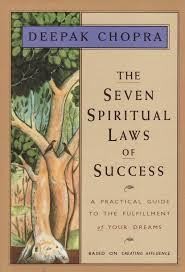Deepak Chopra‘s book, “The Seven Spiritual Laws of Success,” has been such a touchstone for me that I’m writing about each of the seven laws over the coming weeks.
I grew up believing the only way to get what you want is to work hard. My family emphasized the value of a strong work ethic, and I graduated from college focused on powering my way up the career ladder.

Then I met my husband, John, and saw how many times in his life he simply trusted that wild leaps would work out and they did. He didn’t sweat it. He was really lucky, I thought.
But according to Deepak Chopra, John showed me the law of least effort. Not that there’s no value in investing time and effort in doing a job well or learning a skill, but that when you’re in sync with the power of the universe, you can achieve your goals with surprising ease.
“If we observe nature at work, we see that least effort is expended. Grass doesn’t try to grow, it just grows. Fish don’t try to swim, they just swim. Flowers don’t try to bloom, they bloom. Birds don’t try to fly, they fly. This is their intrinsic nature. The earth doesn’t try to spin on its own axis, is the nature of the earth to hurtle through space,” he says.
Similarly, he says, it’s our human nature to realize our dreams easily and effortlessly.
I believe in miracles
“What is commonly called a miracle is actually an expression of the law of least effort,” Chopra says.
A quote often misattributed to Goethe says:
“Until one is committed, there is hesitancy, the chance to draw back — concerning all acts of initiative (and creation), there is one elementary truth that ignorance of which kills countless ideas and splendid plans:
that the moment one definitely commits oneself, then Providence moves too. All sorts of things occur to help one that would never otherwise have occurred. A whole stream of events issues from the decision, raising in one’s favor all manner of unforeseen incidents and meetings and material assistance, which no man could have dreamed would have come his way.
Whatever you can do, or dream you can do, begin it. Boldness has genius, power, and magic in it. Begin it now.“
So it’s not simple shoulder-to-grindstone that gets us what we want. It’s working in harmony with the universe, which means we won’t have to try as hard.
How do you get in sync with the universe? Love.
Nature is held together by love, Chopra says, so when you’re motivated by love, that amplifies the energy you put into your goals.
Seeking power drains your power
Instead of focusing on love, too often we seek power and control over other people.
Chopra points out that our bodies can generate, store and expend energy, and the more efficient you are with your energy, the more energy you can put into accomplishing your goals.
Our egos can lead us to try to control other people or to win their approval, which wastes energy.
“When that energy is freed up, it can be rechanneled and used to create anything that you want,” Chopra says.
One of my favorite bloggers, Christine Kane, wrote a piece years ago about the perils of explaining yourself to other people. It drains your energy, keeps you from trusting your gut and makes you play small.
Chopra agrees it’s a waste of energy.
“If you observe people around you, you’ll see that they spend 99.9 percent of their time defending their point of view. If you just relinquish the need to defend your point of view, in that relinquishment, you will have access to enormous amounts of energy that has been previously wasted,” he says.
Balancing acceptance with responsibility to change
Chopra’s teachings require balance.
You can have goals and focus intensely on achieving those goals — but you can’t get attached to the results of pursuing those goals, according to the law of detachment, which I’ll write about soon.
Similarly, Chopra says we need to accept people and circumstances as they are AND take responsibility for your situation, including responsibility to transform circumstances in whatever way you desire.
In the chapter on the law of karma, Chopra says everything that is happening in this moment is the result of the choices we’ve made in the past. If we don’t like our circumstances, we need to take responsibility for what led us here and for fixing it.
“All problems contain the seeds of opportunity,” he says in the law of least effort.
At the same time, “when you struggle against this moment, you’re actually struggling against the entire universe.”
He suggests surrendering to the moment and being flexible. The alternative is fighting it, blaming others for what we object to, which will cause us to meet resistance. Once we’re fighting, we might try to force a solution, which makes the resistance grow.
 Applying the law of least effort
Applying the law of least effort
- Practice acceptance — accept people, situations, circumstances and events as they are, not as you wish they were.
- Take responsibility for your situation and for everything you see as problems — instead of blaming yourself or others, use this sense of responsibility to find ways to change the situation for the good.
- Remain in a state of defenselessness — don’t defend your point of view or try to convince others to accept your point of view.
Past posts in this series:
- The Seven Spiritual Laws of Success: #1, the law of pure potentiality
- The Seven Spiritual Laws of Success: #2, the law of giving
- The Seven Spiritual Laws of Success: #3, The law of karma

Past posts about being lucky (which is how I often think of least effort)
- Making our own luck by being open to possibility
- Are you willing to be really, really lucky? (on being willing to be lucky, instead of thinking you don’t deserve your big, hairy, audacious dreams)
- Guidance to help you get lucky

